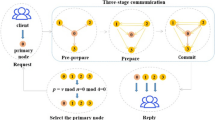Abstract
It is significant to improve Practical Byzantine Fault Tolerance algorithm (PBFT) in consortium blockchain. At present, the serial verification process of transactions in the primary and backups greatly affects consensus efficiency. Meanwhile, the lack of reasonable valuation mechanism in PBFT makes it difficult to motivate existing reliable nodes. Moreover, consensus nodes work in an enclosed environment, where nodes cannot join and exit dynamically.
To solve the shortcomings stated above, we propose a dynamic hierarchical Byzantine fault-tolerant consensus mechanism based on credit (DHBFT). Firstly, we design a hierarchical-parallel scheme composed of consensus nodes, candidate nodes, and ordinary nodes. We realize parallel transaction logic verification in the primary and backups by delegating candidate nodes to verify the validity of transactions preliminarily. Secondly, we create a reward-punishment scheme. The consensus nodes with better performances are assigned higher credit value and have higher probability to become the primary. Thirdly, we propose a dynamic promotion-demotion scheme. It enables faulty nodes to be excluded from the consensus set and reliable candidate nodes to join.
Experimental results show that DHBFT has better efficiency and higher stability. Compared with PBFT, the overall throughput of transactions is increased by 16%, and the average delay is reduced by 12%. Moreover, the proportion of abnormal nodes is basically 0 and much lower than that of PBFT.
Supported by The Fundamental Research Funds for the Central Universities (NO. DUT19ZD209).
Access this chapter
Tax calculation will be finalised at checkout
Purchases are for personal use only
Similar content being viewed by others
References
Nakamoto, S.: Bitcoin: a peer-to-peer electronic cash system. https://bitcoin.org/bitcoin.pdf. Accessed 10 May 2020
Bentov, I., et al.: Proof of activity: extending bitcoin’s proof of work via proof of stake. ACM SIGMETRICS Perform. Eval. Rev. 42(3), 34–37 (2014)
Castro, M., Liskov, B.: Practical byzantine fault tolerance and proactive recovery. ACM Trans. Comput. Syst. 20(4), 398–461 (2002)
Zhang, L., Li, Q.: Research on consensus efficiency based on practical byzantine fault tolerance. ICMIC 2018, 1–6 (2018)
Miller, A. et al.: The honey badger of BFT protocols. In: ACM SIGSAC Conference on Computer and Communications Security, pp. 31–42 (2016)
Lei, K., et al.: Reputation-based byzantine fault-tolerance for consortium blockchain. In: ICPADS, pp. 604–611 (2019)
Cowling, J., et al.: HQ replication: a hybrid quorum protocol for byzantine fault tolerance. In: 7th symposium on Operating system Design Implement, pp. 13–23 (2006)
Reiser, H.P., et al.: Hypervisor-based efficient proactive recovery. In: 26th IEEE International Symposium on Reliable Distributed Systems, pp. 83 − 92 (2007)
Wood, T., et al.: ZZ and the art of practical BFT execution. In: 6th Conference on Computer Systems, pp. 123–138 (2011)
Wang, Y., et al.: Study of blockchains’s consensus mechanism based on credit. IEEE Access 7, 10224–10231 (2019)
Hao, X., et al.: Dynamic practical byzantine fault tolerance. In: IEEE Conference on Communications and Network Security, pp. 1–8 (2018)
Zhang, Q., et al.: Multisignature scheme with threshold value. Comput. Eng. 33(2), 15–17 (2007)
Author information
Authors and Affiliations
Corresponding author
Editor information
Editors and Affiliations
Rights and permissions
Copyright information
© 2020 Springer Nature Switzerland AG
About this paper
Cite this paper
Li, F., Liu, K., Liu, J., Fan, Y., Wang, S. (2020). DHBFT: Dynamic Hierarchical Byzantine Fault-Tolerant Consensus Mechanism Based on Credit. In: Wang, X., Zhang, R., Lee, YK., Sun, L., Moon, YS. (eds) Web and Big Data. APWeb-WAIM 2020. Lecture Notes in Computer Science(), vol 12318. Springer, Cham. https://doi.org/10.1007/978-3-030-60290-1_1
Download citation
DOI: https://doi.org/10.1007/978-3-030-60290-1_1
Published:
Publisher Name: Springer, Cham
Print ISBN: 978-3-030-60289-5
Online ISBN: 978-3-030-60290-1
eBook Packages: Computer ScienceComputer Science (R0)




